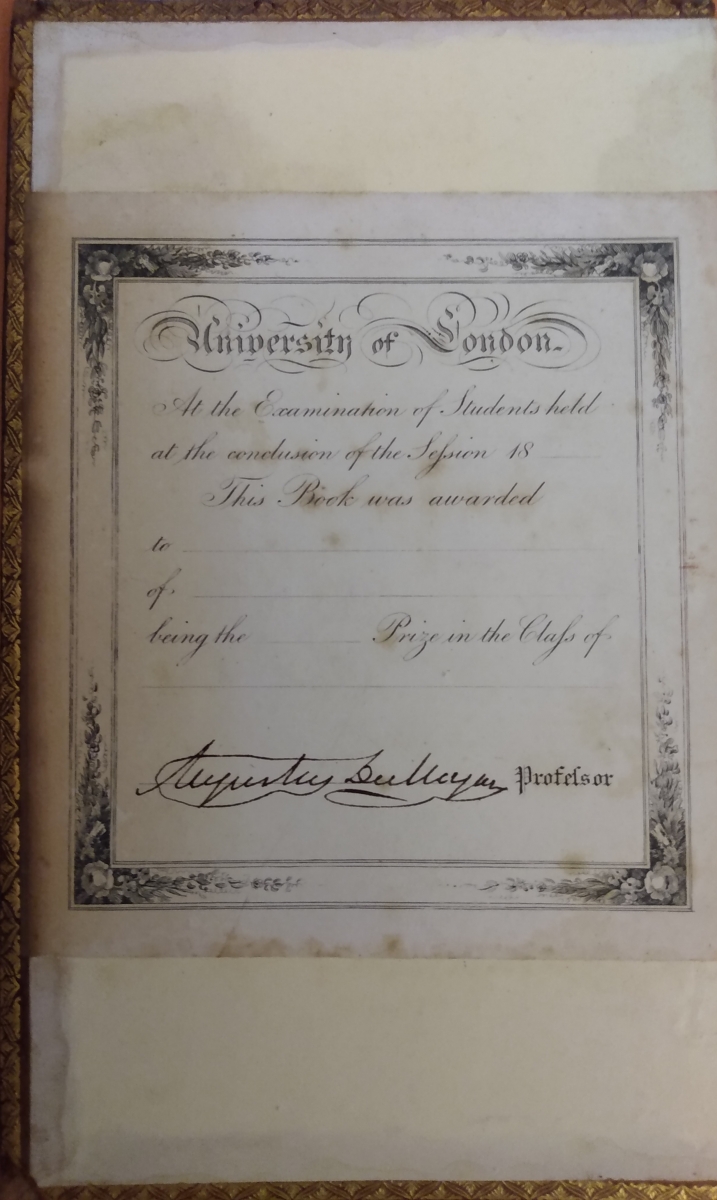- About MAA
- Membership
- MAA Publications
- Periodicals
- Blogs
- MAA Book Series
- MAA Press (an imprint of the AMS)
- MAA Notes
- MAA Reviews
- Mathematical Communication
- Information for Libraries
- Author Resources
- Advertise with MAA
- Meetings
- Competitions
- Programs
- Communities
- MAA Sections
- SIGMAA
- MAA Connect
- Students
- MAA Awards
- Awards Booklets
- Writing Awards
- Teaching Awards
- Service Awards
- Research Awards
- Lecture Awards
- Putnam Competition Individual and Team Winners
- D. E. Shaw Group AMC 8 Awards & Certificates
- Maryam Mirzakhani AMC 10 A Awards & Certificates
- Two Sigma AMC 10 B Awards & Certificates
- Jane Street AMC 12 A Awards & Certificates
- Akamai AMC 12 B Awards & Certificates
- High School Teachers
- News
You are here
A Mysterious Copy of Lacroix’s Traité Élémentaire de Calcul Différentiel et de Calcul Intégral: Signed by De Morgan
What then does this story have to do with my copy of the 4th edition of Lacroix’s Traité Élémentaire de Calcul Différentiel et de Calcul Intégral? The answer is contained on a bookplate, pasted inside the book’s front cover. Bearing the heading “University of London”, it proclaims that
At the Examination of Students held
at the conclusion of the Session 18___
This Book was awarded to __________
of _____________________________
being the _________ Prize in the Class
of ______________________________.
All the necessary details have been left blank—but it does bear the signature of the Professor: Augustus De Morgan. It is thus clear that my copy of the Traité Élémentaire by Lacroix was intended as a prize for one of De Morgan’s classes, but that it was never awarded.

Figure 5. Bookplate in author’s copy of Lacroix’s textbook.
In its earliest years, UCL—in its initial incarnation as the University of London—could not award degrees. Instead, at the end of each year, students in each subject would take exams and, if they were successful, would receive a “Certificate of Honor”. The very best performing students would also receive a prize, in the form of a book or, occasionally, a medal. However, in its first session of operation, namely 1828–1829, student ability and preparation were not perhaps as high as De Morgan and his colleagues might have wished. For example, in the lower division of his senior class, only four out of the nine who entered for the exam obtained certificates. And after Sylvester’s withdrawal, the number of students capable of following the material in the higher senior class must have been almost negligible since at the close of the session, De Morgan reported that “the very small number of them who have made this progress, and the departure of some of them from the University, have made an examination of this division of the [senior] Class impracticable” [Anonymous 1829, p. 6]. As a result, no prize was given that year in his higher senior class.
Things did improve, however, and by the close of the 1829–1830 academic year, De Morgan could report that “the state of preparation of the generality of Students, at the commencement of the present Session, was much superior to that of the last” [Anonymous 1830, p. 32]. Consequently in that and subsequent years, prizes were awarded for all divisions of De Morgan’s mathematics classes. Yet for reasons unknown, the copy of Lacroix remained unclaimed. Perhaps the year of publication on its title page, 1828, possibly chosen as fitting for the inaugural year of the institution, was quickly viewed as out of date. Perhaps other more recent calculus textbooks (or the English translation of Lacroix) were viewed as better awards for deserving students. Whatever the case, the book was clearly forgotten, changing hands over time until, one day in the late 1990s, I bought it from a retiring professor and came face-to-face with De Morgan’s signature and a mystery that intrigues me to this day.
So is this book a remnant from a prize ceremony that took place during UCL’s first year of operation nearly 200 years ago? Could it have been intended originally for the young J. J. Sylvester? And was his premature departure from UCL the reason that this prize was never awarded and, ultimately, that the book ended up in my collection instead of his?
We shall never know.
Adrian Rice (Randolph-Macon College), "A Mysterious Copy of Lacroix’s Traité Élémentaire de Calcul Différentiel et de Calcul Intégral: Signed by De Morgan," Convergence (March 2023)




